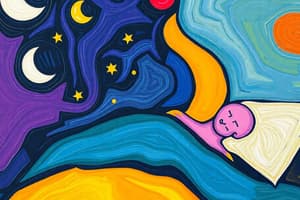Podcast
Questions and Answers
What did the researchers find about the brains of highly hypnotizable people?
What did the researchers find about the brains of highly hypnotizable people?
- Their brains were less active and connected compared to people who cannot be hypnotized.
- Their brains showed more activity and connectivity in areas associated with decision making and attention. (correct)
- Their brains showed no significant differences compared to people who cannot be hypnotized.
- Their brains showed increased activity in areas associated with memory and sensory impressions.
Which of the following is NOT a capability of hypnosis according to the information provided?
Which of the following is NOT a capability of hypnosis according to the information provided?
- Enhancing memory (correct)
- Reducing pain
- Altering sensory impressions
- Increasing strength
What does the text suggest about the man stretched out between two chairs who can hold the weight of the man standing on him?
What does the text suggest about the man stretched out between two chairs who can hold the weight of the man standing on him?
- This ability is a result of the man being in a hypnotic trance.
- The text does not provide enough information to determine if this ability is related to hypnosis.
- This is a unique ability that can only be achieved through hypnosis.
- This ability is not related to hypnosis, and people can do the same thing without being hypnotized. (correct)
What does the text say about the 'observer' in theories of hypnosis?
What does the text say about the 'observer' in theories of hypnosis?
What is the main purpose of the information provided in the text?
What is the main purpose of the information provided in the text?
In the study mentioned, what did the hypnotized subjects report about their experience of putting their arms in ice water?
In the study mentioned, what did the hypnotized subjects report about their experience of putting their arms in ice water?
What is the key to determining whether hypnosis produces unique abilities?
What is the key to determining whether hypnosis produces unique abilities?
What is the significance of the finding that highly hypnotizable people show increased activity and connectivity in brain areas associated with decision making and attention?
What is the significance of the finding that highly hypnotizable people show increased activity and connectivity in brain areas associated with decision making and attention?
What is the main conclusion that can be drawn from the information provided in the text?
What is the main conclusion that can be drawn from the information provided in the text?
What is the significance of the finding that hypnotized subjects in the study reported no pain when their arms were placed in ice water?
What is the significance of the finding that hypnotized subjects in the study reported no pain when their arms were placed in ice water?
Flashcards are hidden until you start studying
Study Notes
Stages of Sleep
- N1 (Stage 1): light sleep, characterized by hypnogogic images, hypnic jerk, and sleep spindles
- N2 (Stage 2): body temperature, breathing, and heart rate decrease, sleep spindles occur
- N3 (Stages 3 and 4): deep sleep, delta waves, growth hormones released, hard to wake up, body at lowest level of functioning
- REM (Rapid Eye Movement): eyes move under eyelids, rest of body is still, 90% of dreaming occurs, EEG similar to awake individual, also referred to as paradoxical sleep
Sleep Disorders
- Insomnia: inability to get to sleep, stay asleep, or get good quality sleep, caused by psychological (worrying, anxiety) or physiological (caffeine, indigestion, pain) factors
- Narcolepsy: disease marked by sudden and irresistible onsets of sleep during normal waking periods, excessive daytime sleepiness, affecting 1 in every 2,000 persons, characterized by sudden REM attacks and cataplexy (sudden loss of muscle tone)
Dreaming Theories
- Freudian interpretation: dreams have hidden, symbolic meaning, reflecting unconscious desires and conflicts
- Problem-solving view (Cartwright): dreams provide opportunity to work through everyday problems and emotional issues, contribute to improvements in mood when people awaken
- Activation-Synthesis Theory: dreams are products of activity in the pons, random signals sent to cortex, brain synthesizes explanation from memories and stored information
- Activation-Information-mode (AIM) Model: dreams may have more meaning than previously thought, information accessed during waking hours influences synthesis of dreams
What Do People Dream About?
- Cognitive Theory of Dreaming: most dreams reflect events that occur in everyday life
- Gender differences: men dream of other males more often, women dream of males and females equally, cultural and genetic influences contribute to these differences
- Sexual content is common in dreams
Hypnosis
- HYPNOSIS CAN: give increased strength, reduce pain, alter sensory impressions, help people relax
- HYPNOSIS CANNOT: reliably enhance memory, regress people to an earlier age or life
- Theories of Hypnosis: works only on immediate consciousness, while hidden "observer" is aware of everything going on, allows for dissociation from pain
Studying That Suits You
Use AI to generate personalized quizzes and flashcards to suit your learning preferences.




